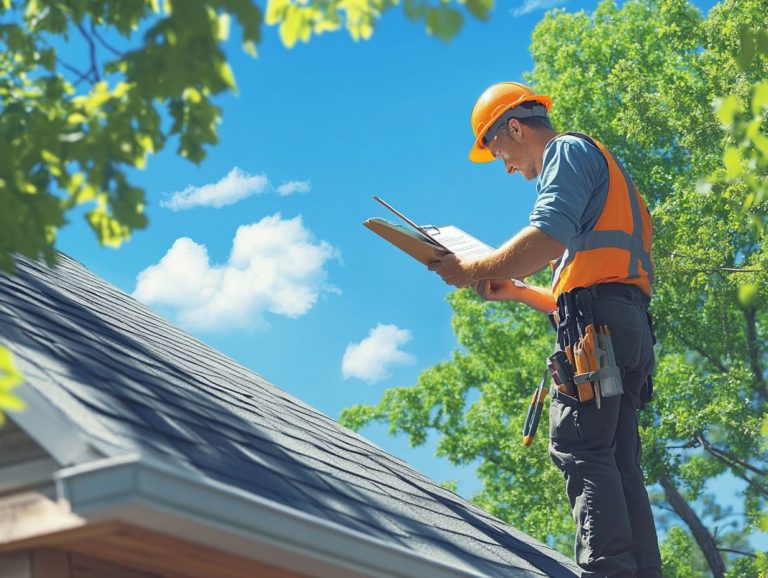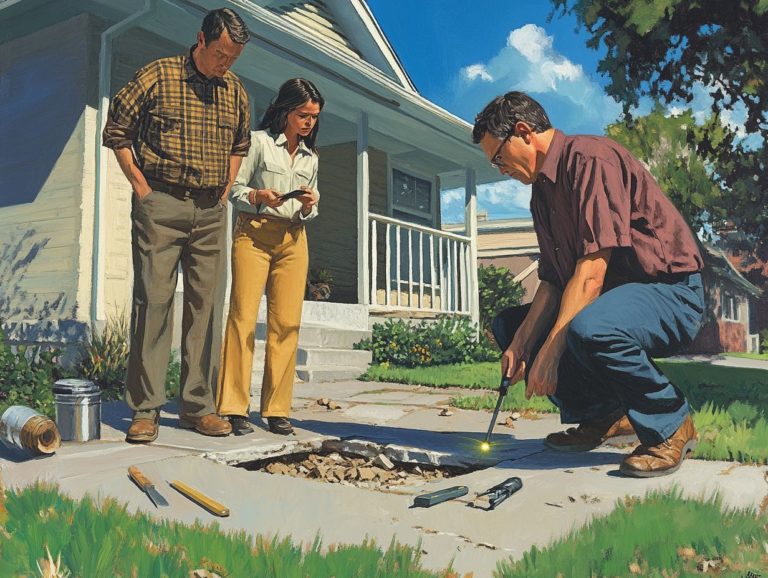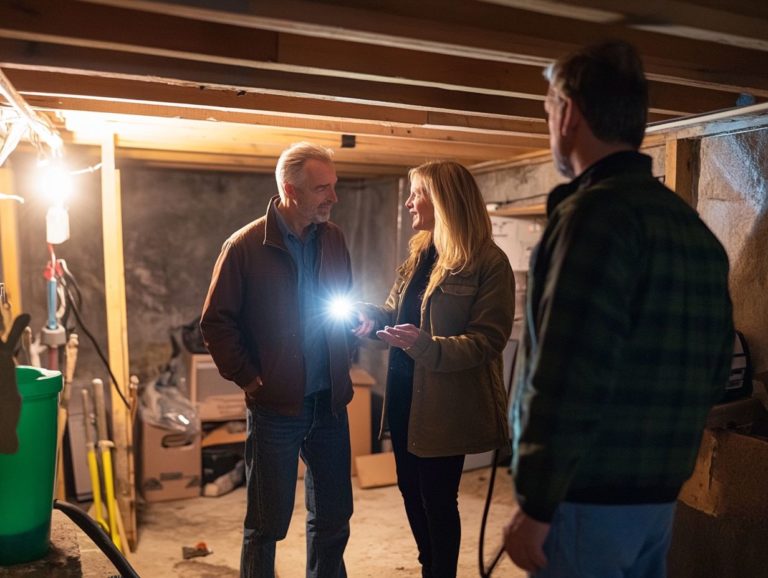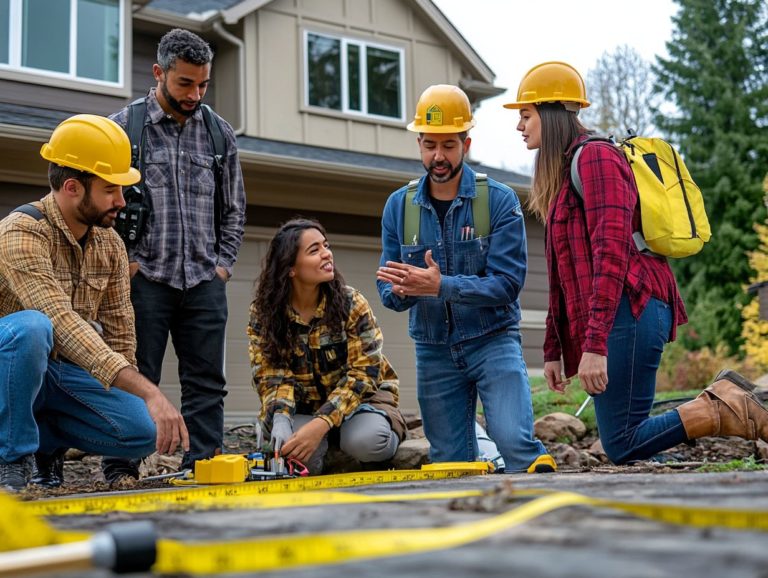Understanding the Home Inspection Report
A home inspection report is an essential document for anyone navigating the real estate market, whether you’re buying or selling a property. It provides a thorough overview of a home’s condition, illuminating both its strengths and weaknesses.
In this article, you ll gain valuable insights into what to expect from a home inspection report, including the variety of information it encompasses and guidance on interpreting the findings. You ll also discover common issues that may arise, strategies to address them, and tips to ensure a successful inspection.
Whether you re a first-time buyer or a seasoned seller, understanding the details of this report will empower you to make informed, confident decisions in your real estate journey.
Contents
- Key Takeaways:
- What is a Home Inspection Report?
- What to Expect in a Home Inspection Report
- Interpreting the Findings
- Common Issues Found in Home Inspection Reports
- How to Address and Resolve Issues
- Tips for a Successful Home Inspection
- Frequently Asked Questions
- What is a home inspection report?
- Why is it important to understand the home inspection report?
- What should I look for in a home inspection report?
- What are common items included in a home inspection report?
- Can I negotiate repairs based on the findings in the home inspection report?
- Should I attend the home inspection and ask questions?
Key Takeaways:

A home inspection report is a detailed document that outlines the condition of a property and any potential issues. When reviewing a home inspection report, pay attention to the types of information included and understand the language and codes used to interpret the findings. For a deeper insight, consider understanding the importance of home inspections, as common issues found in these reports can be red flags. However, there are options for addressing and resolving these issues through repair and negotiation.
What is a Home Inspection Report?
A home inspection report is a detailed document that summarizes the findings of a person trained to inspect homes, reflecting the condition of a property during the home buying process. This report helps you as a potential buyer by providing insights into potential issues and safety concerns, emphasizing the importance of understanding the necessity of home inspections that could impact your real estate investment.
It emphasizes significant problems, estimated repair costs, and general maintenance requirements, giving you the power to make well-informed decisions about your future home whether you’re eyeing properties in Boulder, Colorado, or Boca Raton, Florida.
Overview and Purpose
The primary purpose of a home inspection is to assess the property s condition through a careful inspection performed by a certified home inspector. This essential process provides you with valuable insights into various aspects of the property that may not be readily visible.
By uncovering issues such as water damage, electrical problems, and pest infestations, you can make informed decisions and negotiate necessary repairs or adjustments to the price. Understanding the home’s overall health not only protects your investment but also offers you peace of mind.
Detecting these potential issues early can save you from costly repairs down the line, making a home inspection a critical step in your buying journey. Don t wait! A thorough home inspection can save you from unexpected expenses later.
What to Expect in a Home Inspection Report
A home inspection report typically provides you with comprehensive insights into the property’s condition. It meticulously covers a range of crucial aspects, including the state of the roof, any foundation damage, and significant issues identified during the inspection, helping you understand the role of home inspectors.
This thorough documentation serves as an invaluable resource for understanding the overall health of the home.
Types of Information Included
An inspection report typically encompasses a range of crucial information, including a summary of the property’s condition, identification of major issues, and estimated repair costs. Beyond these essential details, it often brings to light critical findings related to electrical problems that could pose significant safety risks and potential financial burdens for you as the future homeowner.
Pest infestations, a pressing concern, can seriously impact the integrity and value of the property. Safety hazards, such as old roofing or plumbing problems, are also highlighted.
These insights are invaluable during negotiations, providing you with the leverage needed to request necessary repairs or a price reduction. By understanding the details within the inspection report, you empower yourself to make informed decisions, ensuring that you invest wisely in your future home.
Interpreting the Findings
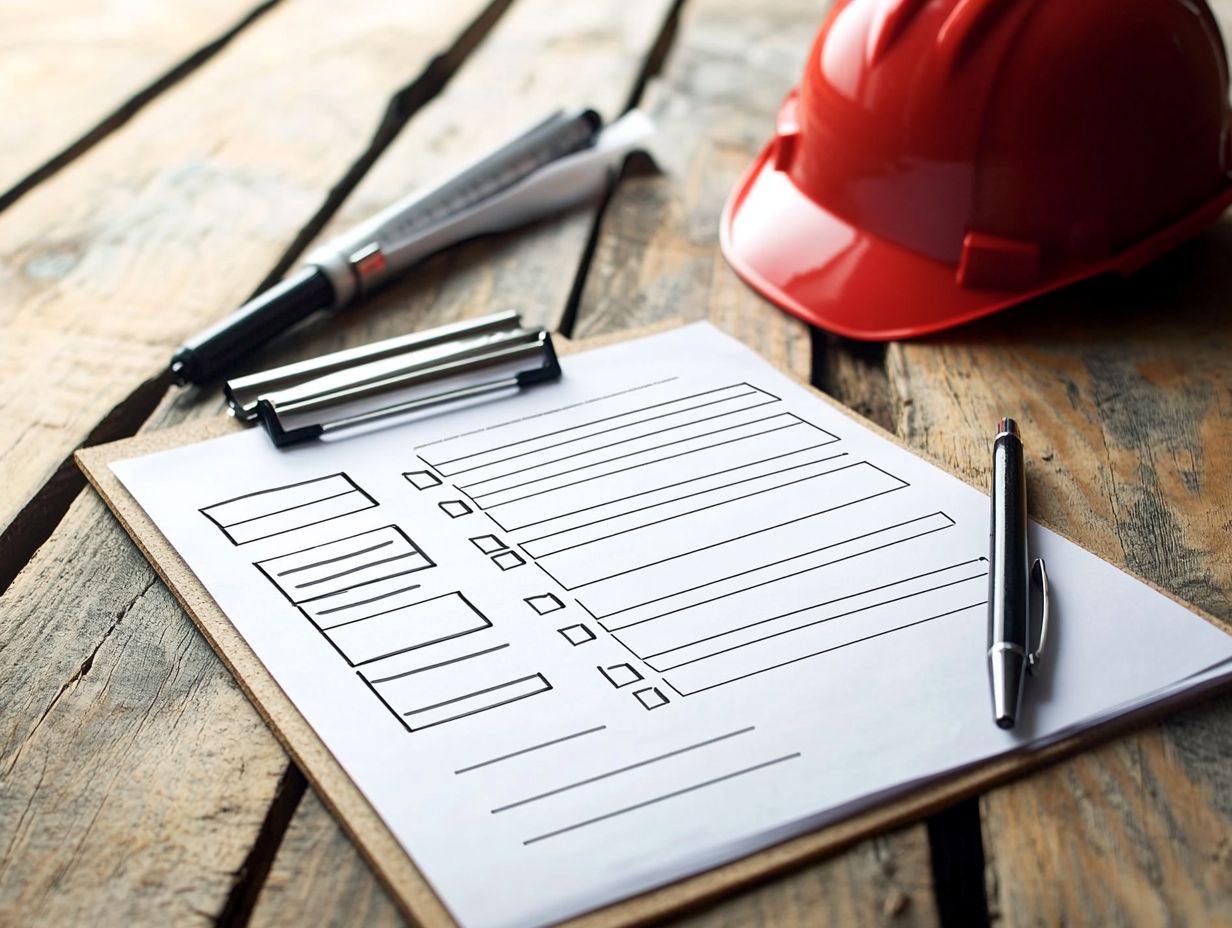
Interpreting the findings in a home inspection report necessitates a solid grasp of the terminology and codes employed by certified home inspectors. Knowing what to look for in a home inspection report allows you to fully comprehend the property’s condition and any issues that have been identified.
Understanding these details is crucial for making informed decisions regarding your investment. Get your home inspected today for peace of mind and smart investment!
Understanding the Language and Codes
Home inspection reports can seem daunting. However, they are designed to show the property’s condition and safety concerns, and understanding the home inspection timeline can help ease the process.
These reports often use specific terms and abbreviations. For instance, ‘FHA’ means Federal Housing Administration standards, and ‘GFCI’ refers to devices that prevent electrical shocks.
Understanding these terms helps clarify potential issues in electrical systems. This knowledge can impact both livability and future repair costs.
Common Issues Found in Home Inspection Reports
When reviewing home inspection reports, you may encounter various common issues. These can range from minor repairs to significant concerns that could substantially affect a property’s value and safety.
Common issues might include:
- Foundation damage
- The condition of the roof
- Various electrical issues
These issues can greatly affect the home s value and safety.
Identifying Red Flags
Identifying red flags during a home inspection is crucial, whether you’re buying or selling. This process helps you recognize potential safety concerns and major issues that could impact the property’s value.
Be alert to signs like water damage, which may show through discoloration on walls or ceilings. Additionally, keep an eye out for pest infestations; evidence of termites or rodents can lead to hefty repair costs and possible structural damage. Addressing these issues early in the negotiation process is vital to protecting your interests.
Don t overlook problems related to the roof, foundation, or outdated electrical systems. These issues can significantly sway a buyer s decision and your leverage during price discussions. Evaluate these factors carefully to empower your decisions!
How to Address and Resolve Issues
Addressing and resolving issues identified in a home inspection report requires a thoughtful strategy. You must navigate repair negotiations wisely to secure the best deal!
Understanding these nuances can lead to a more harmonious transaction, ensuring that all parties feel satisfied with the outcome.
Options for Repair and Negotiation
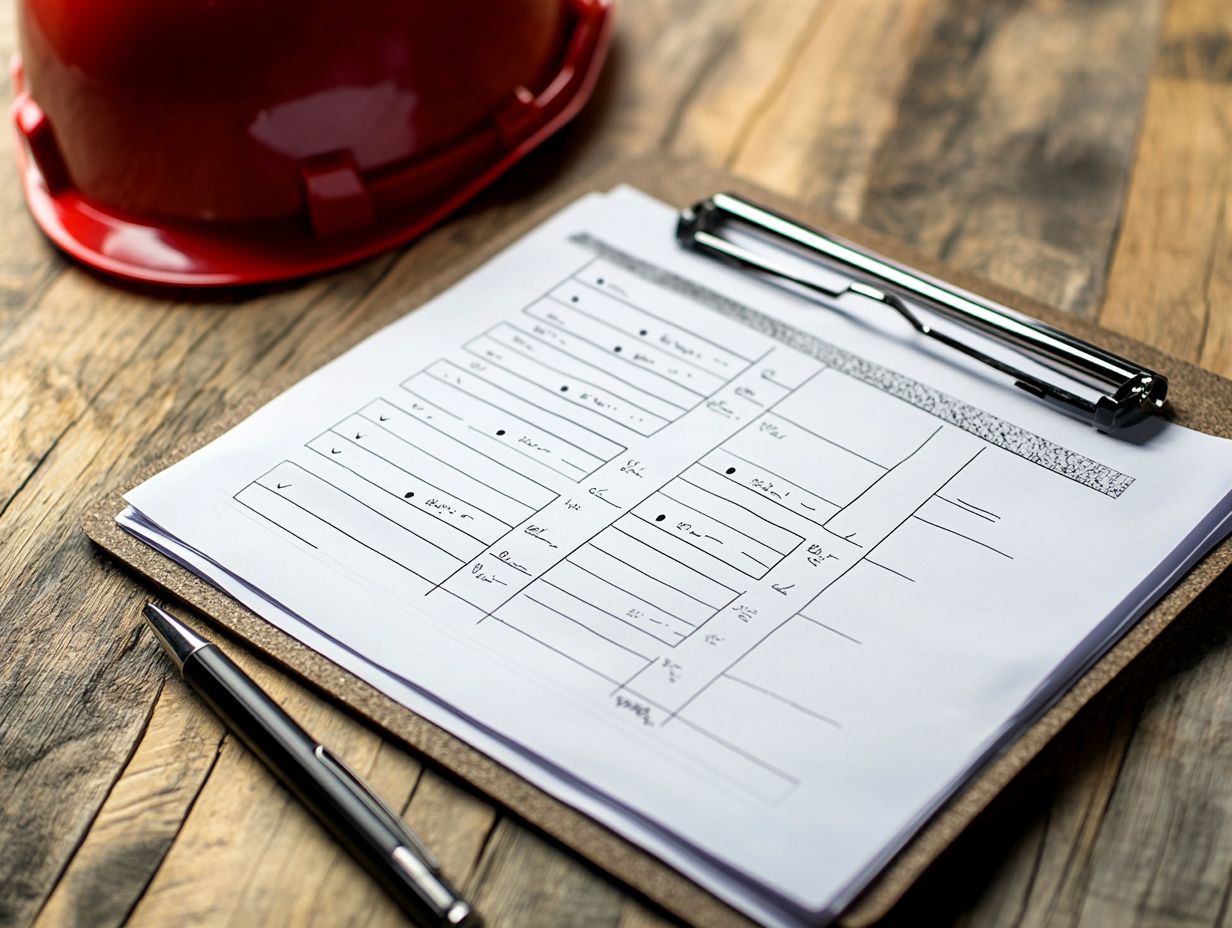
When you encounter issues stemming from a home inspection report, you have several viable options for repair and negotiation. You can request repair credits or ask the seller to address necessary repairs before closing.
Navigating these discussions is crucial for ensuring a smooth transaction. It allows you to voice your concerns while maintaining a positive relationship with the seller.
A savvy approach involves gathering estimates from contractors to back up your repair requests. This can provide formidable leverage during negotiations. Prioritizing repairs based on safety and functionality is wise, ensuring that the most critical issues are handled first.
By calmly expressing your needs and demonstrating flexibility, you can foster cooperation. This paves the way for amicable resolutions that satisfy both parties and facilitate a successful home purchase.
Tips for a Successful Home Inspection
Preparing for a successful home inspection is crucial for both buyers and sellers. It can greatly influence the trajectory of the home buying process.
From grasping the nuances of inspection conditions to selecting a qualified home inspector, every detail matters in ensuring a favorable outcome.
Preparing for the Inspection and Choosing an Inspector
Preparing for the inspection and selecting the right certified home inspector is essential for a seamless home buying experience. It significantly impacts your decision-making process and future satisfaction with the property.
Gather critical documents such as the seller’s disclosure statement, previous inspection reports, and maintenance records to provide insight into the home’s history. This proactive approach gives you the power to better understand potential issues.
When choosing a qualified inspector, look beyond mere credentials. Consider their experience and seek reviews or testimonials from past clients to ensure confidence in your choice.
By prioritizing thorough preparation and selecting a reputable inspector, you pave the way for informed investments that will serve you well in the future.
Frequently Asked Questions
What is a home inspection report?
A home inspection report is a written document detailing the findings and evaluations of a professional inspector after a thorough visual examination of a property. To better understand the process, it’s helpful to know what to expect with a home inspection.
Why is it important to understand the home inspection report?

Understanding your home inspection report is essential because it provides valuable information about the property’s condition, including any potential issues or safety concerns. For more details on what to look for, check what to expect in a home inspection report. This knowledge helps buyers make informed decisions about their purchase.
What should I look for in a home inspection report?
When reviewing a home inspection report, pay attention to the overall condition of the property, major structural or safety concerns, and recommended repairs. Additionally, understanding the home inspector’s role can help clarify the severity and urgency of any issues mentioned, which is crucial.
What are common items included in a home inspection report?
A standard home inspection report typically covers the home’s exterior and interior, including the foundation, roof, plumbing, electrical systems, heating, ventilation, and air conditioning (HVAC), as well as major appliances. It may also include information on the integrity of the home’s structure, insulation, and ventilation.
Can I negotiate repairs based on the findings in the home inspection report?
Yes, you can negotiate repairs based on the findings in the report. If significant issues are found, buyers can request the seller to either make the necessary repairs or lower the home’s price to cover those costs.
Should I attend the home inspection and ask questions?
You definitely want to attend the inspection! This gives you a better understanding of the property’s condition and allows you to address any concerns with the inspector in real time.
Act quickly if significant issues arise! A home inspection is a vital step in the home buying process.

